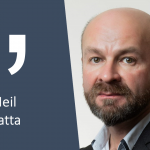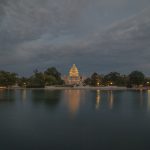BLOG: Those that challenges state authority – The critics of the welfare state and the child protection system are diverse with a range of motives for their engagement. Blogpost by Yngve Nedrebø (Historian, Chair of Human Rights – Norway). I have always been genuinely concerned with how research ought to be representative, ethical, and critical. […]
Rebecca Schiel, Bruce M. Wilson, Malcolm Langford, Christopher M. Faulkner (2022) British Journal of Politics and International Relation (IF 2.422, Scopus 4.600) Democracies are commonly thought to provide greater levels of public goods than autocracies. Given that many public goods are provided locally, higher levels of local democracy are further thought to result […]
Blogpost by Neil Datta Secretary of the European Parliamentary Forum for Sexual and Reproductive Rights Gilead, Margaret Atwood’s authoritarian dystopia in The Handmaid’s Tale where women’s role is reduced to forced procreation, has served as powerful symbol for progressive groups around the world in denouncing the erosion of human rights, specifically women’s rights. And Poland […]
New article by Arkaja Singh Recognition of the right to water in Indian courts has had little impact on the ground. This paper explores the seeming disjuncture between what happens in the court and the everyday reality of living with a less-than-perfect claim on city water services in India’s urban slums. The paper seeks to […]
Güneş Murat Tezcür, Rebecca Schiel and Bruce M. Wilson (2021) Development and Change, Volume 52, Issue 6, p. 1343-1369 Under what conditions can a human rights-based approach be successfully utilized? This article argues that the efficacy of a human […]
R. Schiel, B. M. Wilson and M. Langford (2021) WATER 13(12), 1676. (IF 3.103, Scopus 3.7) Ten years after the […]
B. M. Wilson, O. Rodriguez & S. Morales (2021)
In Albert, R, D. Landau, P. Faraguna, and S. Drugda. ICON and the Clough Center for the Study of Constitutional Democracy. ISBN: 978-0-692-15916-3
The global COVID-19 pandemic and the state’s response to it dominated the social, political, economic and legal landscape of Costa Rica in 2020. The government’s measures to combat the pandemic included mandatory travel restrictions, shuttering of mass public events, and curbs on business activities. These salutary actions, while successful in comparison with most other countries […]
New article by Mathea Loen and Siri Gloppen The international norm development that in 2010 culminated with the UN Resolution on the Human Right to Water and Sanitation changed international law. To what extent did this influence the parallel legal developments evident in many national constitutions across the globe? This article analyses the mobilisation for […]
New article by Sabrina Kozikis and Inga T. Winkler Communities across the United States face a widespread water crisis including risks of contamination, rate increases, shut-offs for non-payment, and dilapidating infrastructure. Against this background, a right to water movement has emerged which has found its strength in coalition-building and collectivity. Activists demand change using the […]
 Those that challenges state authority
Those that challenges state authority









